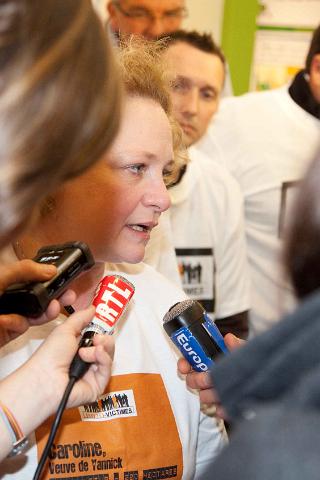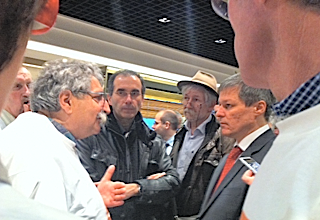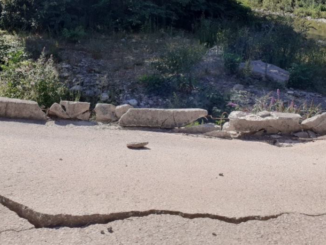![phyto-victimes-in-SIA-protest[Claude-Stefan]](https://www.arc2020.eu/wp-content/uploads/2012/02/phyto-victimes-in-SIA-protestClaude-Stefan-300x206.png)
Pesticide victims descended on the Salon de l’Agriculture in Paris (SIA) yesterday to tell the public the truth about the dangers of agricultural chemicals. Their first stop was the Union de l’Industrie de la Protection des Plantes (UIPP) stand, the industry body that promotes chemicals for crops in France.
In a statement the Phyto-Victimes association declared: “For the first time in France – and probably anywhere in the world – professional users of pesticides, direct victims of these products, are uniting and acting together as an association.” Describing the visit to the UIPP stand as “symbolic”, the membership hoped to open an honest debate and identify the real culprits.
Decades of glossy advertising suggested better crop performance, rural tranquility and safety was a simple matter of spraying pesticides. “This marketing pitch promoted certain practices while skirting round the product’s potential danger,” warns Phyto-Victimes (in French).
“In those adverts we’d see confident farmers filling their spray tanks with bare hands; spraying crops with the tractor window wide open; moving around while spraying without protective clothing or a mask. All these images contributed to trivialising the use of pesticides and could have led to unsafe practices.” Today, after all that reassuring advertising, the UIPP is now referring affected farmers back to the precautions that should have been taken to handle these products.
An editorial in the French paper Le Monde suggested a striking parallel between pesticides and asbestos. Could the Phyto-Victimes be just the tip of a pesticide scandal iceberg, the paper wondered.
In the case of Paul Francois, who was exposed to a now-banned pesticide in 2004, the French justice system found in his favour on February 13. The case is still subject to an appeal by the manufacturer, but his condition was recognised as an occupational illness in 2008.

Yesterday, about 15 Phyto-Victimes, some of them widows of pesticide victims argued their corner on the UIPP stand in Paris. Behind their protest was the educational stand for “Passion – céréale,” where school groups and teaching staff are told about the profitable upside of monoculture cereals. The stand is supported by industrial farming and plays a part in the French government’s national food and nutrition plan.
Against the backdrop of a slogan “Bouger, c’est facile” (Move, it’s easy) the protesters reminded UIPP staff and warned visitors that pesticides came with a downside. Denis used to farm 97 hectares: “The slow accumulation of pesticides in my body triggered a cancer and deprived me of the use of my legs,” he told journalists. Today, he is in a wheelchair.
Following the protest, French prime minister Francois Fillon has promised to meet the association before the end of the week. Later on Monday, Denis and his campaigning colleagues waylaid European agriculture commissioner Dacian Cioloş, on his way to a meeting at SIA. Four Phyto-Victimes also saw French farm minister Bruno Le Maire for half an hour. The minister agreed that he had underestimated the scale of the problem and that he would call in the Mutualité Sociale Agricole agency to review the definitions of occupational illnesses.

“Pesticides are a key component of the industrial agricultural system which would fall apart without chemicals,” WWF France declared. “This is the model of agriculture that is so widely promoted by the public authorities, the agrochemical industry and the largest farming union: this system must be changed.”
WWF France president Isabelle Autissier explained: “It is a matter of urgency to get away from industrial agriculture system which is seriously contaminating the environment and water, in particular. It is a setback to employment and life in the country, with a loss of one in four agricultural jobs in 10 years across the EU. It is crushing farmers’ livelihoods, puts harmful substances on our plates and, most cynically of all, poisons farmers.”
For more on this story, see:
- Générations Futures Press Release (in French) at www.semaine-sans-pesticides.
com/download/CP20022012_ <http://heal.tttp.eu/sites/miseenligneinscriptionsSPAP. pdf all/modules/civicrm/extern/ >url.php?u=687&qid=17846 - Related Press Release (in French) Manifestation devant le stand de l’UIPP au salon de l’agriculture <http://heal.tttp.eu/sites/
all/modules/civicrm/extern/ >url.php?u=688&qid=17846 - Related Press Kit (in French) at www.phyto-victimes.fr/2012/02/
dossier-de-presse- <http://heal.tttp.eu/sites/manifestation-au-salon-de- lagriculture/ all/modules/civicrm/extern/ >url.php?u=689&qid=17846 - Phyto Victimes campaign website (in French) at www.phyto-victimes.fr
- Générations Futures website (in French) at www.generations-futures.fr <http://heal.tttp.eu/sites/
all/modules/civicrm/extern/ >url.php?u=691&qid=17846
Related news stories:
French farmers fighting pesticide taboo, Euractiv 8th March 2012





